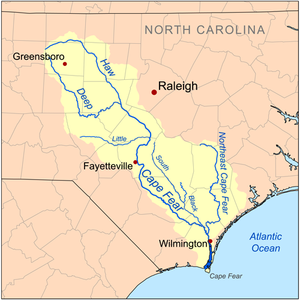Deep River (North Carolina)


Deep River is a tributary of the Cape Fear River, approximately 125 miles (200 km) long, in north central North Carolina in the United States.
Paddling is popular on the river. Deep River is flanked by the planned Deep River State Trail and several other parks and preservation areas including Carbonton Dam Park, House in the Horseshoe Historic Site, Deep River Park and Deep River Camelback Truss Bridge, Endor Iron Furnace, White Pines Nature Preserve, Lockville Dam, Canal and Powerhouse, and Mermaid Point.[1]
The Cape Fear shiner, a critically endangered minnow, inhabits the river.
Course
Deep River rises in the Piedmont country in western Guilford County, east of Kernersville. It flows southeast past High Point and Randleman, forming the Randleman Lake. It passes northeast of Asheboro, then flows east to Franklinville then to Ramseur, then passing north of Sanford. The Rocky River enters the Deep River at the White Pines Nature Preserve.[2] Deep River joins Haw River at Mermaid Point near Haywood, just below the Haw's emergence from Jordan Lake, to form the Cape Fear River.
Dams
Deep River has 12 dams or relict dam structures and is the source river of the Randleman lake project that covers 3000 acres (12 km²) of property on the river near U.S. Route 220. The river crosses the fall line of North Carolina, an area where rivers are quite rocky and have a moderately high gradient. This gradient was used to power mills along the river to support the early textile industry in North Carolina. The river, popular with canoeists, was a center of a great deal of activity during the American Revolution at places such as Franklinville and the House In The Horseshoe.
The Lockville Dam, built of stone, is the only portion of the 19th century Deep River lock and dam system that remains today.[1]
Until recently, the Deep River was host to the Carbonton Dam, the largest dam on the river at 17 feet (5.2 m) high and 270 feet (82 m) wide. In the fall of 2005, the dam was removed for the purpose of creating environmental mitigation credit by Restoration Systems, LLC, a leading environmental mitigation company in North Carolina. The project restored 10 miles (16 km) of the former impoundment around the House in the Horseshoe to free-flowing river.
